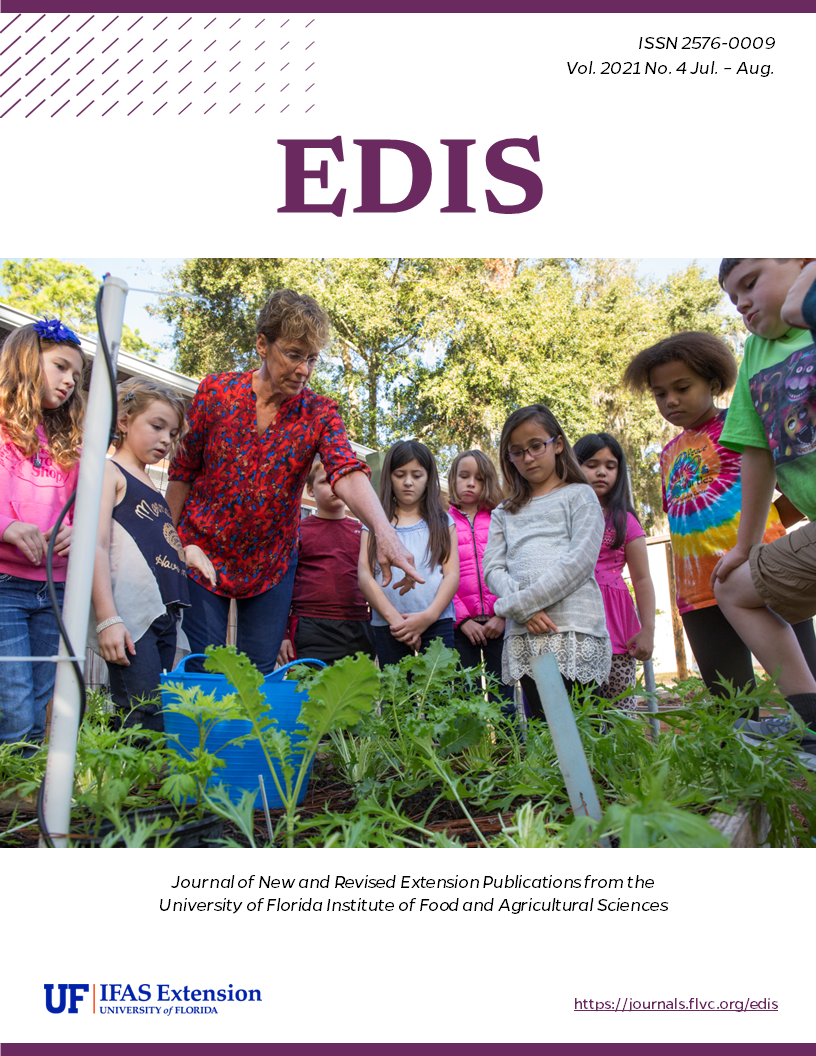Resumen
Florida leads the commercial production of caladiums, a popular ornamental. In Florida, root-knot, sting, and stubby root nematodes are found in caladium fields. Root-knot nematodes are considered the most important of all pests in caladiums that are grown in sand. This publication will help caladium growers understand what plant-parasitic nematodes are and current nematode management strategies for the caladium industry.
Citas
Anonymous. 2020. Plant Disease Development and Control. American Phytopathological Society (APS) website: https://www.apsnet.org/edcenter/disimpactmngmnt/topc/EpidemiologyTemporal/Pages/ManagementStrategies.aspx
Bird, D. M., V. M. Williamson, P. Abad, J. McCarter, E. G. J. Danchin, P. Castagnone-Sereno, and C. H. Opperman. 2009. "The Genomes of Root-Knot Nematodes." Annual Review of Phytopathology 47:1333-1351. https://doi.org/10.1146/annurev-phyto-080508-081839
Braz, G. B. P., R. S. Oliveira Jr., W. T. Crow, and C. A. Chase. 2016. "Susceptibility of Different Accessions of Crotalaria juncea to Belonolaimus longicaudatus." Nematropica 46:31-37.
Bricka, C., R. McSorley, and J. J. Frederick. 2000. "Effect of Hot Water Treatments on Root-Knot Nematodes and Caladium Tubers." Proceedings of the Florida State Horticultural Society 113:158-161.
Brito, J.A., H. Han, J. D. Stanley, M. Hao, and D. W. Dickson. 2012. "First Report of Laurel Oak as a Host for the Pecan Root-Knot Nematode Meloidogyne partityla in Florida." Plant Disease 97:151. https://doi.org/10.1094/PDIS-02-12-0201-PDN
Brito, J. A., R. Kaur, R. Cetintas, J. D. Stanley, M. L. Mendes, T. O. Powers, and D. W. Dickson. 2010. "Meloidogyne spp. Infecting Ornamental Plants in Florida." Nematropica 40:87-104.
Brito, J. A., S. A. Subbotin, H. Han, J. D. Stanley, and D. W. Dickson. 2015. "Molecular Characterization of Meloidogyne christiei Golden and Kaplan, 1986 (Nematoda, Meloidogynidae) Topotype Population Infecting Turkey Oak (Quercus laevies) in Florida." Journal of Nematology 47:169-175.
Church, G. 2005. "First Report of the Root-Knot Nematode Meloidogyne floridensis on Tomato (Lycopersicon esculentum) in Florida." Plant Disease 89:527. https://doi.org/10.1094/PD-89-0527B
Crow, W. T., D. P. Weingartner, D. W. Dickson, and R. McSorley. 2001. "Effect of Sorghum-Sudangrass and Velvetbean Cover Crops on Plant-Parasitic Nematodes Associated with Potato Production in Florida." Journal of Nematology 33:285-288.
Deng, Z. 2018. Caladium. In J. Van Huylenbroeck (ed) Ornamental Crops. Handbook of Plant Breeding, vol. 11. Springer, Cham. https://doi.org/10.1007/978-3-319-90698-0
Desaeger, J. A. 2018. "Meloidogyne hapla, the Northern Root-Knot Nematode, in Florida Strawberries and Associated Double-Cropped Vegetables." EDIS https://doi.org/10.32473/edis-in1224-2018
Dover, K. D., R. McSorley, and K. H. Wang. 2005. "Resistance and Tolerance of Caladium Cultivars to Meloidogyne incognita." Soil and Crop Science Society of Florida Proceedings 64:98-102.
Han, H., J. A. Brito, and D. W. Dickson. 2012. "First Report of Meloidogyne enterolobii Infecting Euphorbia punicea in Florida." Plant Disease 96:1706. https://doi.org/10.1094/PDIS-05-12-0497-PDN
Jones, J. T., A. Haegeman, E. G. J. Danchin, H. S. Gaur, J. Helder, M. G. K. Jones, T. Kikuchi, R. Manzanilla‐López, J. E. Palomares‐Rius, W. M. L. Wesemael, and R. N. Perry. 2013. "Top 10 Plant‐Parasitic Nematodes." Molecular Plant Pathology 14:946-961. https://doi.org/10.1111/mpp.12057
Kokalis-Burelle, N., E. N. Rosskopf, and R. D. Hartman. 2010. "Evaluation of Soil Treatments for Control of Meloidogyne arenaria in Caladium Tubers (Caladium × hortulanum) and Nematode Susceptibility of Selected Cultivars." Nematropica 40:177-189.
Kokalis-Burelle, N., J. A. Brito, and R. D. Hartman. 2017. "Susceptibility of Seven Caladium (Caladium × hortulanum) Cultivars to Meloidogyne arenaria, M. enterolobii, M. floridensis, M. incognita, and M. javanica." Journal of Nematology 49:457-461.
Lehman, P. S. 2002. "Phytoparasitic Nematodes Reported in Florida." Nematology Section, Bureau of Entomology, Nematology, and Plant Pathology Division of Plant Industry, Florida Department of Agriculture and Consumer Services.
https://www.fdacs.gov/ezs3download/download/25244/516160/phyotnema
McSorley, R. 1999. "Host Suitability of Potential Cover Crops for Root-Knot Nematodes." Journal of Nematology 31:619-623.
McSorley, R., J. J. Frederick, and R. J. McGovern. 1999. "Extraction of Meloidogyne incognita from Caladium Corms." Nematropica 29:245-248.
McSorley, R., K.-H. Wang, and J. J. Frederick. 2004. "Host Suitability of Caladium Varieties to Meloidogyne incognita." Nematropica 34:97-101.
Sekora, N. S., C. W. Crow, and T. Mekete. 2012. "First Report of Meloidogyne marylandi Infecting Bermudagrass in Florida." Plant Disease 96:1583. https://doi.org/10.1094/PDIS-06-12-0544-PDN
Overman, A. J. 1985. "Root-Knot Nematodes in Gladiolus Corms." Nematology Circular 123. https://www.fdacs.gov/content/download/10914/file/nem123
Pokharel, R. R., G. S. Abawi, J. M. Duxbury, C. D. Smat, X. Wang, and J. A. Brito. 2010. "Variability and the Recognition of Two Races in Meloidogyne graminicola." Australasian Plant Pathology 39:326-333. https://doi.org/10.1071/AP09100
Rhoades, H. L. 1961. "Preliminary Studies on Eradication of Root-Knot in Caladium Tubers." Proceedings of the Florida State Horticultural Society 74:393-397.
Rhoades, H. L. 1964. "Effect of Hot Water Treatment of Seed Tubers and Soil Fumigation for Control of Root-Knot on Yield of Caladiums." Plant Disease Reporter 48:568-571.
Wang, K. H., and R. McSorley. 2004. "Management of Nematodes and Soil Fertility with Sunn Hemp Cover Crop." EDIS (18) https://doi.org/10.32473/edis-ng043-2004

